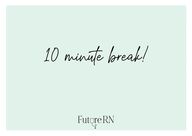
Return to flip book view
10 minute break!
Mental Health
You are caring for a patient who hasdementia and is becoming agitated andis having difficulty staying in his chair.What should your priority response?
A seat alarm in the chairStart with the least restrictiveintervention
If child abuse is suspected, but notconfirmed, is reporting necessary?
Yes! Healthcare workers are legallyrequired to report any suspicions ofchild abuse
What are your communicationtechniques when caring for a quietand withdrawn patient withsuspected abuse?
Direct and honest communication. Provide complete privacy which willallow the patient and nurse toestablish trust and rapport, which canlead to open communication.
What are your nursing actions whencaring for a patient with anorexia?
Assess their vital signsWeight daily Monitor I&O and electrolytes Limit exercise Positive reinforcement
You administer lorazepam to yourpatient with severe anxiety. 30 minutes later the patient’s RR is 10and they are difficult to wake up. Whatwould you do?
Administer flumazenil immediately
Your patient is anxious about anupcoming procedure, whattherapeutic techniques would youimplement?
Explore their feelings Do not dismiss the concernsShow empathyEncourage expression of theirfeelings
What is the difference between adelusion and a hallucination?
A delusion is a false belief A hallucination involves the senses,like hearing something.
What is the best way to preventlithium toxicity?
Prevent dehydration!
What are your nursing considerationsfor a patient going through alcoholdetoxification?
RestRestoring fluid and electrolytesMonitor for hallucinationsMonitor for fever and seizuresMonitor for delirium tremens
What symptoms would you assess forpotential narcotic use/abuse?
CNS depression: VS decrease, LOCdecrease, RR decrease
Maternity
What does GTPAL assess for?
Gravidity TermParity Abortion Living
What are some ways babies regulatetheir temperature?
Brown fatFlexed fetal position Peripheral vasoconstriction Vernix
Which patient will you administerRhogam?
Rh-negative mothers (for example,blood type O negative).
What is the difference between anearly deceleration and a latedeceleration?
An early deceleration is normal. With a late decelerations, the HRdecreases after the contraction. In thiscase, and there may be a problem.
How do we keep newborn babiessafe immediately after birth?
Applying ID bands after birthFootprints taken after birth Security system must be in place
Give an example of presumptive,probable and positive signs ofpregnancy.
Presumptive: Period absent Probable: Positive (+) pregnancy test Positive: Fetal movement palpated bya doctor or nurse
Using Naegele’s Rule, calculate theexpected date of delivery if a patientsLMP was March 11th.
1st day of last period: 3/11, minus 3calendar months: 12/11, plus sevendays: 12/18
Pediatrics
The congenital heart defects that beginwith the letter T are cyanotic defects. Whatdoes a cyanotic defect mean and what willyou see in your patient?
This means that deoxygenated blood isbeing pumped out to the body andoxygenated blood is being pumped to thelungs. This will cause the baby to showsymptoms of low oxygen.
How will we educate the caregivers of ababy born with a cleft lip?
You will instruct the caregivers to keep theinfant upright during feedings andfrequent burping.
What is a known risk factor for respiratorydistress syndrome (RDS)?
Infants of mothers with diabetes areat higher risk for this, sohyperinsulinemia is a risk factor.
What are the cardinal signs of epiglottitis?
DroolingDysphonia (hoarseness)Dysphagia (swallowing difficulties)Distress "4 Ds"
You are caring for a patient diagnosedwith Hirschsprung disease. What do youexpect for symptoms and treatment plan?
Constipation, ribbon like stool, abdominaldistention, vomiting. Require 2 surgeries between 18 and 24months for normal bowel function.
You are caring for a child admitted withintussusception, what manifestationswould you expect?
Stool mixed with blood and mucus,sometimes called currant jelly stool(because of how it looks).
What are the names of the two fontanellesand when do they close?
The posterior fontanels close at 2 monthsage and the anterior fontanelle closes at18 months.
You patient has hemophilia, what are youmonitoring for?
Bleeding! Remember they lack clottingfactors so are prone to bleeding.
Common causes of a sickle cell crisis?
Fever, anxiety, excessive exercise, higher elevations
What are your nursing considerations for achild diagnosed with Phenylketonuria(PKU)?
Screened via heel stick for all babies. Special milk substitute for infants (Formula:Lofenalac), low protein diet for children (nomeat, dairy, eggs, beans, and artificialsweetener.
Lets talk about your exam day!
its easy to get here, hard to stay here. You're doing it.